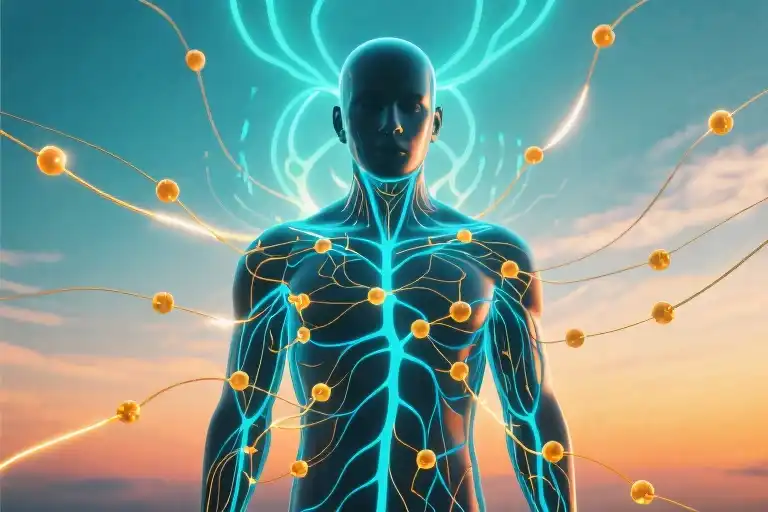You just got your annual physical results back – blood work perfect, cholesterol optimal, BMI in the goldilocks zone. By all medical standards, you’re the picture of health. Yet every night finds you staring at the ceiling at 3 AM, your mind racing through tomorrow’s to-do list while your stomach knots with undefined dread. So here’s the uncomfortable question: if your body checks all the right boxes but your mind feels like it’s running on empty, are you truly healthy?
This paradox exposes the outdated notion that mental health simply means the absence of diagnosable disorders. The World Health Organization defines mental health as “a state of well-being in which every individual realizes their own potential, copes with normal stresses of life, works productively, and contributes to their community.” It’s not just about avoiding breakdowns – it’s about having the emotional bandwidth to show up fully in your relationships, the cognitive clarity to make thoughtful decisions, and the psychological resilience to bounce back from setbacks.
Consider these eye-opening statistics:
- 1 in 5 adults experiences mental health challenges that don’t meet clinical disorder criteria but significantly impact quality of life
- Employees with poor mental health report 35% lower productivity than their peers
- Chronic stress contributes to 60% of doctor’s office visits in the US
These numbers reveal what many of us feel intuitively – that mental health operates on a spectrum far more nuanced than “sick” versus “well.” Your ability to focus during an important meeting, to patiently comfort a crying child after a long day, or to simply enjoy a quiet moment without guilt or anxiety – these are all barometers of your mental well-being.
The modern understanding recognizes three interconnected dimensions:
- Emotional health: Regulating feelings without being overwhelmed by them
- Social health: Maintaining fulfilling connections and boundaries
- Cognitive health: Thinking clearly and making values-aligned decisions
Like a three-legged stool, weakness in any area destabilizes the whole structure. That’s why someone can technically be “not depressed” while still struggling with chronic people-pleasing, decision paralysis, or emotional numbness that prevents authentic living.
This expanded definition matters because it shifts our approach from crisis management to daily maintenance. Just as you don’t wait for cavities to brush your teeth or for heart attacks to exercise, mental health care works best as preventive medicine. The good news? Small, consistent practices in the right areas create compound interest for your psychological well-being – and we’ll explore exactly how to implement them in the following sections.
Redefining Mental Health: Beyond the Absence of Illness
For decades, mental health was narrowly defined as simply not having a diagnosable mental disorder. If you weren’t experiencing hallucinations or suicidal thoughts, the assumption was you must be psychologically fine. This outdated perspective fails to capture the rich complexity of human well-being in our modern world.
Contemporary psychology now recognizes mental health as a dynamic state encompassing three interconnected dimensions:
- Emotional Well-being: The ability to experience and regulate a full range of emotions without being overwhelmed by negative states
- Social Well-being: Maintaining fulfilling relationships and feeling connected to communities
- Cognitive Well-being: Having clarity of thought, focus, and a sense of purpose
Consider the case of Michael, a 32-year-old tech executive. By traditional standards, he was ‘mentally healthy’ – no depression or anxiety diagnoses. Yet he experienced what psychologists call high-functioning depression: chronic emptiness despite professional success, emotional numbness in relationships, and persistent fatigue masked by caffeine. His annual physical showed perfect biomarkers, but his quality of life was deteriorating.
This phenomenon highlights why we must move beyond binary thinking about mental health. Research from the World Health Organization reveals that nearly 1 in 5 adults globally experience this type of psychological suboptimal functioning – not sick enough for clinical intervention, but not thriving either.
Your mental health operates like an invisible operating system, quietly influencing:
- Decision Making: Stress reduces cognitive flexibility by up to 40% (Harvard Business Review)
- Relationships: Emotional availability predicts relationship satisfaction more than compatibility scores
- Life Satisfaction: Psychological well-being correlates more strongly with longevity than cholesterol levels
The good news? Unlike computer systems, our mental health can be upgraded through conscious daily practices. But first, we need to recognize its true scope – not just the absence of illness, but the presence of vitality across all life domains.
Genetics and Trauma: The Two Fundamental Truths About Mental Health
The Genetic Blueprint of Happiness
Research shows about 50% of our baseline happiness is genetically predetermined. If your parents tended toward pessimism, you might recognize similar thought patterns in yourself. Twin studies demonstrate this hereditary link clearly – identical twins raised apart often share remarkably similar emotional tendencies despite different environments.
But here’s the empowering truth: genetic predisposition isn’t destiny. While you may inherit tendencies toward anxiety or mood fluctuations, you control how these manifest. Cognitive Behavioral Therapy (CBT) proves particularly effective in rewiring thought patterns, with studies showing 60-80% improvement rates for anxiety disorders. Think of your genetic makeup as the hardware – you can’t change the processor, but you absolutely can upgrade the software through conscious effort.
The Universal Experience of Trauma
Virtually everyone encounters significant trauma – research suggests four to five major adverse events per lifetime is average. These range from job loss and heartbreak to more severe experiences like abuse or accidents. Timing matters profoundly; childhood trauma can alter brain development, while adult trauma often shakes our fundamental assumptions about safety and predictability.
Yet psychologist George Bonanno’s groundbreaking work reveals most people demonstrate remarkable resilience. His studies of trauma survivors show over half eventually report positive psychological changes – increased appreciation for life, stronger relationships, or newfound personal strength. This doesn’t minimize trauma’s pain, but highlights our capacity for post-traumatic growth.
Navigating the Aftermath
When facing genetic challenges or traumatic experiences, consider these approaches:
- Awareness Without Judgment
- Notice inherited tendencies (“There’s Dad’s quick temper”) without self-criticism
- Track trauma responses (elevated startle reflex, avoidance patterns)
- Targeted Interventions
- For genetic anxiety: Daily 5-minute meditation to strengthen pause-before-reacting skills
- For trauma: EMDR therapy to reprocess distressing memories
- Growth Framing
- View genetic traits as raw material for self-mastery
- Reframe trauma as a painful but transformative teacher
Remember, mental health isn’t about eliminating all vulnerabilities – it’s about developing compassionate strategies to live fully despite them. The very traits that sometimes feel like burdens often become sources of depth and empathy when understood and channeled wisely.
The 5 Pillars of Mental Health: Science-Backed Strategies That Actually Work
Mental health isn’t a luxury—it’s the operating system that runs your entire life. While genetics and past experiences set the baseline, research shows daily habits account for nearly 40% of our psychological well-being. These five evidence-based pillars form the foundation of sustainable mental health improvement.
1. Social Connections: The 3-Person Rule
Harvard’s 85-year happiness study revealed one non-negotiable truth: quality relationships outweigh wealth, fame, and even genetics in predicting long-term well-being. But here’s the counterintuitive part—you only need 3-5 deeply connected individuals.
Building your tribe:
- Schedule weekly “vulnerability hours” with close friends (no small talk allowed)
- Practice active listening by repeating back emotions (“Sounds like you’re feeling…”)
- Ditch draining “obligation friendships”—research shows negative social interactions spike cortisol levels by 26%
2. Lifestyle Triad: Sleep, Movement, Nutrition
Your brain doesn’t operate in a vacuum. Neuroscience confirms these three factors directly regulate neurotransmitters:
Sleep:
- The 7-hour threshold: Below this, your amygdala (fear center) becomes 60% more reactive
- Pre-bed ritual: 1 hour screen-free + 20 minutes journaling reduces sleep latency by 42%
Movement:
- 10-minute walk breaks boost BDNF (brain fertilizer) more than marathon sessions
- Resistance training 2x/week lowers depression risk equivalent to antidepressants
Nutrition:
- The 80/20 gut-brain rule: 80% whole foods keeps your microbiome happy
- Omega-3s from fish/flaxseed increase gray matter in emotion-regulation areas
3. Mindfulness: The 5-Minute Brain Reset
MRI scans show regular meditation:
- Shrinks the amygdala (fear center) by 19%
- Grows the prefrontal cortex (rational thinking) by 16%
Beginner’s protocol:
- Set phone timer for 5 minutes
- Focus on breath sensations at nostrils
- When distracted (you will be), gently return focus
- End by scanning body for tension
Pro tip: Pair with morning coffee—caffeine enhances meditation’s neuroplasticity effects.
4. Nature Therapy: The 120-Minute Sweet Spot
University of Exeter research found:
- 120 weekly minutes in green spaces maximizes mental health benefits
- Park walks lower rumination (overthinking) by 31% compared to urban walks
- “Forest bathing” increases NK cells (cancer-fighting immunity) by 40%
Urban adaptations:
- Desk plants improve focus equivalent to $1,000 ergonomic chairs
- Nature sounds during work lower stress hormones by 17%
5. Professional Support: 3 Therapy Indicators
Contrary to pop psychology, you don’t need a “breakdown” to benefit from therapy. Consider professional help when:
- Duration: Symptoms persist >2 weeks (the brain’s natural reset period)
- Function: Daily tasks feel overwhelmingly difficult
- Feedback: Multiple people express concern
Modern options go beyond Freudian couches:
- CBT apps like Woebot teach cognitive restructuring
- Online platforms like BetterHelp offer flexible scheduling
- Group therapy provides social proof you’re not alone
Remember: Seeking help isn’t weakness—it’s like hiring a personal trainer for your mind. Even Olympic athletes need coaches.
Making It Stick: The 1% Rule
Instead of drastic overhauls, focus on 1% daily improvements:
- Replace 1 social media scroll with 1 deep breath
- Swap 1 processed snack for 1 handful of nuts
- Trade 1 late-night show for 1 extra sleep hour
These micro-wins create compound interest for your mental health. As psychologist B.F. Skinner proved: Small, consistent reinforcements build lasting change better than occasional grand gestures.
Resources & Action Plan: Your Mental Health Toolkit
Now that we’ve covered the fundamentals of mental health and practical improvement strategies, let’s consolidate everything into an actionable plan. This curated toolkit combines scientifically-backed resources with simple daily practices to help you build sustainable mental wellness habits.
Digital Tools for Daily Practice
- Meditation Apps (for mindfulness training):
- Headspace: Best for beginners with themed anxiety/sleep packs
- Waking Up (Sam Harris): Philosophy-integrated approach
- Insight Timer: Largest free meditation library (50,000+ guides)
- Sleep Optimization:
- Sleep Cycle: Tracks sleep phases via sound analysis
- f.lux: Reduces blue light from screens automatically
- Why We Sleep (Matthew Walker): Essential sleep science audiobook
- Nature Connection:
- AllTrails: Finds local hiking routes with difficulty ratings
- Forest: Gamifies screen-free time (plants virtual trees)
5-Minute Mental Health Check
Answer these weekly to track progress:
- How many nights this week did I get 7+ hours of sleep?
- Did I have at least one meaningful social interaction?
- When did I last spend 30+ minutes outdoors?
- What thought pattern kept recurring?
- On a scale of 1-10, how would I rate my emotional resilience?
30-Day Micro-Habit Challenge
Choose one foundational habit to focus on each month:
- Week 1-2:
- Sleep: Set consistent bedtime/wake-up time (±30 mins)
- Movement: 10-minute walk after lunch
- Mindfulness: 5-minute morning breathing exercise
- Week 3-4:
- Social: Text/Call one friend every other day
- Nature: Weekend “green hour” (park/backyard time)
- Digital detox: No screens 30 mins before bed
When to Seek Professional Support
Consider consulting a therapist if you notice:
- Persistent sleep/appetite changes (2+ weeks)
- Withdrawal from usual activities
- Difficulty concentrating at work/school
- Increased substance use
- Overwhelming sadness/anger
Pro tip: Many therapists offer free 15-minute consultations to assess fit—don’t hesitate to “interview” multiple professionals.
Maintenance Mindset
Remember that mental health isn’t about perfection. Some days you’ll meditate for 20 minutes, other days you’ll forget entirely—and that’s normal. What matters is returning to these practices consistently, not flawlessly.
“You wouldn’t judge your physical health by one bad workout. Give your mind the same grace.”
Ready to start? Pick one tool or habit from this list and implement it today. Small steps compound into lasting change.
Conclusion: Your Mental Health Operating System
Mental health isn’t a final destination you reach after completing some checklist—it’s more like maintaining the operating system that runs every aspect of your life. Just as your phone needs regular updates to function smoothly, your psychological well-being requires consistent attention and small, sustainable upgrades.
The Micro-Habit Revolution
Here’s the truth bomb no one tells you: massive overhauls rarely stick. That’s why we’re focusing on micro-habits—the tiny changes that create ripple effects:
- Tonight’s challenge: Power down all screens by 10 PM (yes, that includes “just one more episode”)
- Tomorrow’s win: Take your coffee break under a tree instead of at your desk
- This week’s experiment: Text one friend a genuine compliment (no emoji shortcuts)
These aren’t just random suggestions—they’re scientifically-backed neurohacks that rewire your brain’s default patterns. When University College London studied habit formation, they found the sweet spot: small actions repeated consistently create lasting change.
Your Mental Health Toolkit
Consider these your essential apps for psychological maintenance:
- The Sleep Optimizer
- 7-8 hour non-negotiable window
- Pre-bed “blue light lockdown” (90 minutes before sleep)
- The Social Connection Widget
- Quality > quantity (3 meaningful relationships beat 300 Instagram followers)
- Weekly vulnerability check-ins (share one real struggle)
- The Nature Refresh Button
- 120-minute weekly minimum (broken into park walks, balcony gardening, etc.)
- Barefoot grounding sessions (the earth’s electrons reduce inflammation)
When to Call Tech Support
Even the best operating systems need professional maintenance sometimes. These are your therapy trigger points:
- Persistent system errors (2+ weeks of sleep disturbances or appetite changes)
- Unexplained crashes (sudden emotional outbursts or numbness)
- Compatibility issues (strained relationships affecting multiple life areas)
Remember: Seeking help isn’t weakness—it’s the ultimate system upgrade. The American Psychological Association reports that therapy improves functioning in 75% of participants, with effects lasting years after treatment.
Your Next Step (No Boot Camp Required)
Don’t let this be another article you forget by tomorrow. Right now, choose one micro-action from below:
- [ ] Set phone bedtime alarm for 9:45 PM (15-minute wind-down buffer)
- [ ] Bookmark a local park on Google Maps for tomorrow’s lunch break
- [ ] Text a friend: “Got 20 minutes this week for a real catch-up?”
For those ready to go deeper, we’ve created a 49-Day Mental Health Upgrade Challenge—a step-by-step guide to rebuilding your emotional resilience. It’s not about quick fixes, but sustainable changes that stick. (And yes, it includes the science behind every recommendation, because you deserve to know why it works.)
“You wouldn’t expect a single software update to protect your computer forever. Why expect one article, one therapy session, or one meditation retreat to safeguard your mind?”
Your mental health operating system is waiting for its next update. Will you hit ‘install’ today?





